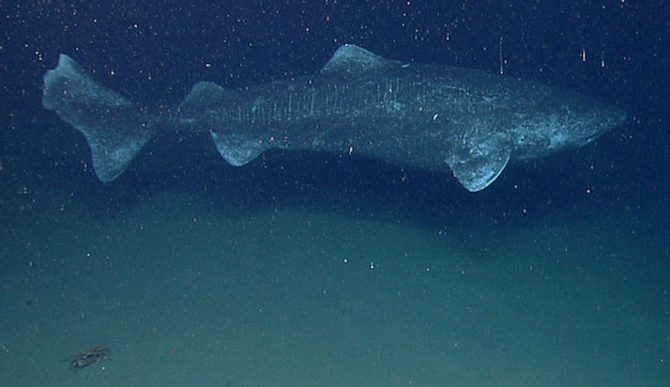
Imagine. This little guy was born in the age of thee and thou and will die in the age of LOL and BRB. Oh, the stories it could tell.
Age is just a number, they say. Well it’s a damn impressive number when you’re able to talk about it in terms of centuries. The oldest human to ever live – as far as we know – was a frenchwoman named Jeanne Louise Calment who reached the 122 year mark. She surpassed the 1 century mark with gusto. But anything living four centuries? That’s crazy talk!
Well, apparently not all that crazy. According to a new study, conducted by University of Copenhagen researchers, Greenland sharks can live at least four hundred years. What the what?
Greenland sharks have officially become the longest living vertebrates on the planet, a title previously thought to be held by the bowhead whale that is known to live 211 years, reports The Guardian.
To put things in perspective, a Greenland shark celebrating its 400th birthday today would have been born in 1616. I know, simple arithmetic.
But consider this: 1616 is the same year of William Shakespeare’s death. The Americas were still made up of colonial holdings of the British, Dutch, French, Spanish, and Portuguese empires. Fast forward through the history of the United States (a revolutionary war, a civil war) and the rest of the globe (the scientific revolution, two world wars, an era of independence movements across the world, the birth of modern digital technology), and it’s incredible to envision a single creature baring witness to all of this in its lifetime – of course, in the limited capacity that’s even possible from the depths of the sea.
The downside of longevity is these guys are also late bloomers – reaching sexual maturity at around 150-years-old, scientists say. And that’s not all they do rather slowly. Greenland sharks grow less than one centimeter per year.
Funny enough, scientists always had an idea these guys were old, but have been unable to for decades. This new study is the first of its kind.
According to The Guardian, scientists went about determining the age of 28 Greenland sharks using proteins found in their eyes. Apparently the era of nuclear testing in the 1950s and 60s led to elevated levels of carbon-14 in the atmosphere. That becomes a useful point of reference – essentially the more carbon-14 found in the eye lens protein of a shark, the younger it probably is.
The largest of the sharks scientists aged was a female measuring over 16 feet. They estimate her age at approximately 392, but admit it could be anywhere from 272 to 512-years-old. Scientists are hopeful the Greenland shark’s new found fame will promote further research and conservation.

